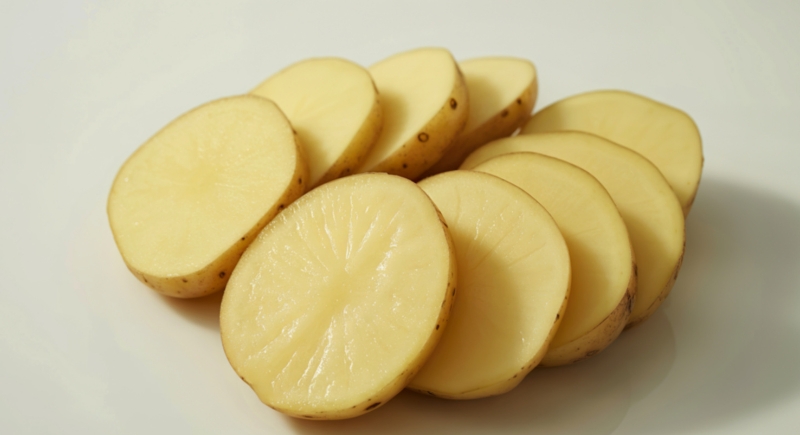Can You Safely Eat Raw Potatoes?
Potatoes are everywhere, such as on dinner plates, in fast food chains, and at family gatherings. They rank as the most consumed vegetable in America and show up in endless forms. There’s one form, however, that people wonder about–raw potatoes.
At first glance, a raw potato looks harmless, yet its nutritional quirks and chemical makeup tell a more complicated story.
Resistant Starch and Digestion

Image via Canva/Sofia Buti’s Images
Raw potatoes carry a significant amount of resistant starch. This carbohydrate moves through the small intestine without breaking down, eventually reaching the colon, where bacteria ferment it. This process produces short-chain fatty acids, including butyrate, which help support colon health and reduce inflammation in the digestive tract.
Research has linked resistant starch to better blood sugar control, improved insulin sensitivity, and feelings of fullness that may assist with appetite regulation. Yet the same fermentation process creates gas and bloating when resistant starch appears in high amounts.
Eating large portions of uncooked potatoes may quickly turn uncomfortable for this reason. Cooking alters the starch structure and breaks it into forms that the body can handle more easily and that provide quick energy. In moderation, resistant starch has benefits, but in raw potatoes, it often causes more trouble than it is worth for most people.
Vitamin C in Raw Potatoes
One surprising advantage of eating raw potatoes is their higher vitamin C content. Heat reduces vitamin C levels, so baking or boiling often leaves less of this nutrient behind. Uncooked potatoes, on the other hand, carry about twice as much vitamin C as cooked ones. This vitamin plays a critical role in collagen formation, immune defense, and antioxidant activity inside the body.
While that advantage sounds appealing, the raw potato’s flavor and texture present real obstacles. A bite feels chalky, starchy, and bitter, which discourages regular consumption. More practical sources of vitamin C, such as citrus fruits, bell peppers, or strawberries, provide the same benefits without the unpleasant taste.
Plus, heating potatoes still preserves many valuable key minerals and vitamins, like potassium and fiber, which makes them a safer and more enjoyable option.
Antinutrients and Nutrient Absorption

Image via Getty Images/Azurite
Breaking down a raw potato also means dealing with antinutrients such as lectins and protein trypsin inhibitors. These compounds interfere with the absorption of important minerals such as calcium and iron. Large amounts of lectins may also irritate the stomach and lead to nausea or diarrhea.
Fortunately, you can cut down on these compounds by cooking. For example, studies show that heating potatoes can inactivate certain trypsin inhibitors and cut lectin content in half or more.
Overall, preparing potatoes with heat remains the best strategy for reducing compounds that interfere with digestion and nutrient use in the body.